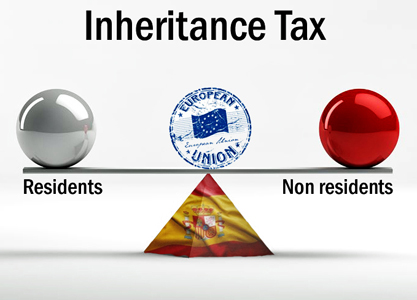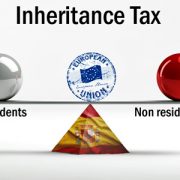Why should you make a Spanish Will for your Spanish Estate
/in Articles, Inheritance, Tax /by mveale
Traditionally, our advice to all our clients was, if you have property in more than one Country, you should make a Will in every Country where you have assets. It seems to make sense, that whether you have a few million, or a few pounds or euros, in England, Ireland or elsewhere, make an Will, then if you also have a villa in Spain, or a small sum in a Bank there, make a Spanish Will.
That way each jurisdiction can get on with the formalities of putting the terms of your Will into effect as soon as possible after you pass on, with no need for the Spanish authorities to wait until the your national Probate Registry and Tax officials have finished with your papers in your country.
The European Succession Regulation No.650/2012 (or “Brussels IV”) came into force last year, but England, Ireland or Denmark are still not signatories to it. This new regulation is supposed to make things simpler for other citizens with property in other Countries of Europe. Basically, you can now say in your national Will that it should dispose of all of your assets, both in Ireland, England and Europe and that the Laws of Succession of your country should apply.
As an example, under the Laws of Succession of England, you can leave your belongings to whoever you choose in your Will. There is no requirement in England, as there is in other Countries [including Scotland even] that certain persons – usually spouse and /or children – should take a share of your estate as a matter of law. So if you are English, make your Will in England and elect English Succession law, then Brussels IV will tell the Spanish authorities that they must not seek to impose their own usual forced heirships upon your wishes.
Unfortunately, there will always be room for problems to arise. There are many legal issues arising from scenarios involving unusual combinations of place of residence, country of citizenship, and country of domicile, from which scope for extensive argument and additional expense can arise.
The first thing you will need to prove to the Spanish authorities is that your Will was validly made in your country. They will not so much be impressed by the fact that the Will is stated to have been signed in the presence of two witnesses, as alarmed by the fact that it may not have any Notary stamp or certificate – They may also say; “I’ve never dealt with this before. The Will is in English. I can’t read English. What is the Probate Registry of Dublin, Leeds etc, and what are its powers?”
There are likely to be other areas of “mismatch” when seeking to persuade Spanish authorities to accept a Will made under a foreign jurisdiction as valid.
Some foreign requirements pertaining to Wills seem very sensible. In the Philippines, a blind person cannot make a valid Will unless “Article 808. If the testator is blind, the Will shall be read to him twice; once, by one of the subscribing witnesses, and again, by the notary public before whom the will is acknowledged” (Civil Code of the Philippines).
In Ireland, a blind person can make a Will but it cannot be admitted to Probate unless one of the witnesses gives a sworn statement about what took place. So again, problems can be envisaged in such a case where the Testator has outlived his witnesses and no such sworn statement was made.
This could, at the end, lead our clients to follow a more expensive and time consuming procedure in order to register the property in Spain, than simply executing a properly laid out Spanish Will. Therefore, our conclusion remains that the new Law also does create some new problems. It still remains simpler and cheaper for those who have an estate in Spain to make a separate Will regulating separately solely their Spanish estate.
It is advisable to revise your previous Will to ensure that is adapted to the Brussels IV new regulation.
For practical reasons, we keep on insisting on making a Spanish Will to cater for the inheritance of your Spanish estate. In the end, it will save time money.
Buying a property in spain? You’ll need a spanish resident visa
/0 Comments/in Articles /by Spanish Legal ServicesNon resident selling a property in Spain. What about Capital Gain Tax?
/0 Comments/in Articles /by Spanish Legal ServicesPlusvalia. Municipal Capital Gain Tax. What is it?
/0 Comments/in Articles /by Spanish Legal ServicesNew Law on investment Residence in Spain. Property = Visa
/in Articles /by Spanish Legal ServicesOn 28-09-2013 has been enacted the Investors’ Support and Internationalization Act which includes, among others measures, a Spanish residency programme that will allow investors to become permanent investors if they invest, at least, €500,000 in a property. The law intends cleary to facilitate non EU nationals traveling to, or residing in Spain, who intend to carry out a ‘relevant investment’.
Let´s see together the most important items of the new law:
What is a relevant investment?
According to the new Law, the following will suffice to attain residency in Spain:
- An investment of at least€2,000,000 in Spanish Government bonds.
- An investment of at least €1,000,000 in shares of Spanish companies.
- An investment of at least €1,000,000 with a Spanish-based bank or financial entity (basically, depositing that money in a savings or fixed deposit account).
- An investment of at least€500,000 in Spanish property (one or more), per applicant, provided the first €500,000 of the property value is unencumbered (mortgage free).
- A business investment that is to be carried out in Spain and is deemed of public interest for which purpose, at least one of the following conditions will be considered relevant: a) jobs it will create b) socioeconomic impact in the geographical area where the activity is to be carried out and c) relevant contribution to technological or scientific innovation.
Investment by foreign companies also qualify for residency provided it does not originate from an offshore tax haven, and that the investor owns, directly or indirectly, the majority of its voting rights and has also the right to designate or remove the majority of the members of the board of directors.
Investment Residency Visa and Investment Residency Permit
The Act has created 2 different types of documents to enter and reside in Spain, the Residency Visa and the Residency Permit.
The Residency Visa is valid for up to 1 year, and the Residency Permit is valid for up to 2 years, which can be extended for a further 2 years. This would give a total of 5 years, 4 of which are deemed proper residency and the first one, just the right to stay and live (an important distinction because 5 years of continued residency entitles the beneficiary to reside permanently in Spain). In addition to meeting the conditions to qualify for the Investors’ Residency Visa, an applicant for an Investors’ Residency Permitwill have to comply with the following:
- Hold an Investors’ Residency Visa that is not overdue by more than 90 days over the expiration date.
- Have travelled to Spain at least once during the validity of the Visa.
- Prove that the investment that enabled the applicant to receive the Visa is still in place.
What other requirements have to be met?
The Act will also require that any applicant complies with the following (standard in the Non-Lucrative or Non-Working Residency Permit):
- Not be in Spain irregularly.
- Be over 18 years of age.
- Absence of a criminal record in the country of original residency.
- Have medical insurance.
- Have sufficient money or financial means to support the applicant (and family) during the period of stay in Spain: if we are guided by the prerequisites of the Non-Lucrative Residency Permit, the applicant will need to prove earning of at least €2,128/month, plus an additional €532/month per family member.
Application Process and Timescales
The Residency Visa will be applied for and granted by the Spanish Consulate of the demarcation of the applicant. The Residency Authorization will be applied for and granted by Directorate General of Migrations. An application for a Residency Visa will be resolved in a maximum period of 10 days, except where the application is subject to the EU visa Code. The Residency Authorization will be granted in a maximum period of 20 days from application after which period, if the Consulate has not responded, the application will be presumed granted.
How would it work, in practical terms?
An applicant that wishes to apply for a Residency Visa under the Act will first need to apply for an ordinary visa, with a view to travel to Spain and investigate investment options/opportunities, meet with lawyers, real estate agents, banks, etc.
Once a decision is made and the investment carried out, the Residency Visa will have to be applied for at the Consulate. Obviously, it is possible that an investor decides to proceed with the investment operations remotely (for instance, purchasing a property via a lawyer, with a Power of Attorney) and, on conclusion of the property conveyance transaction, he applies for a Residency Visa with the required proof of his investment i.e. Property Title Deeds. The Act does stipulate that the investment needs to be maintained during the period of the validity of the Residency Visa or Residency Permit, and that routine checks may be carried out to verify if this is the case.
Do I have to be in Spain for more than 6 months during any year period?
Specifically, NO! The Act stipulates that Residency Visa or Residency Permit holders do not need to spend more than 6 months in Spain, with a view to renew the permit (which implies that, as stipulated in the law, provided they are in Spain at least once during the period of the Residency Visa, they are pretty much free to spend their time as they wish, in Spain or in any other country). This means a very significant change with the previous regulation.
Can I become a Permanent Resident in Spain or a Spanish Citizen through this method?
YES. In fact, the Act specifically states that the applicant’s absences will not prejudice the right to permanent residency (5 years onwards) and citizenship.
Can a person still apply for permanent residency without having to invest the sums in this law i.e. buying a property worth say €200,000, with a €180,000 mortgage?
The Act has not modified the other existing types of residency permit applications, which are:
- Non-Lucrative Residency Permit (Autorización de Residencia No-Lucrativa)
- Self-Employed Work and Residency Permit (Autorizacion de Residencia y Trabajo Por Cuenta Propia)
This means a person can still apply for residency in Spain via the regular -above- procedures.
Can I apply if I already have a (unencumbered) property in Spain worth €500,000?
The Act does not include investors who already had a property in Spain prior to its enactment although, nothing stops them from selling, buying again and then apply for the Investors Residency Visa and further, the Investors Residency Permit. People that comply with the other financial criteria (having cash deposits, shares etc.) can apply, so there is always other practical ways to obtain the same result.
We hope this brief resume of the Law helps you to understand the new regulation, and to set an investment strategy to obtain residency rights in Spain, if that is your goal.
Javier Herrera Llamas, Spanish Legal Services










